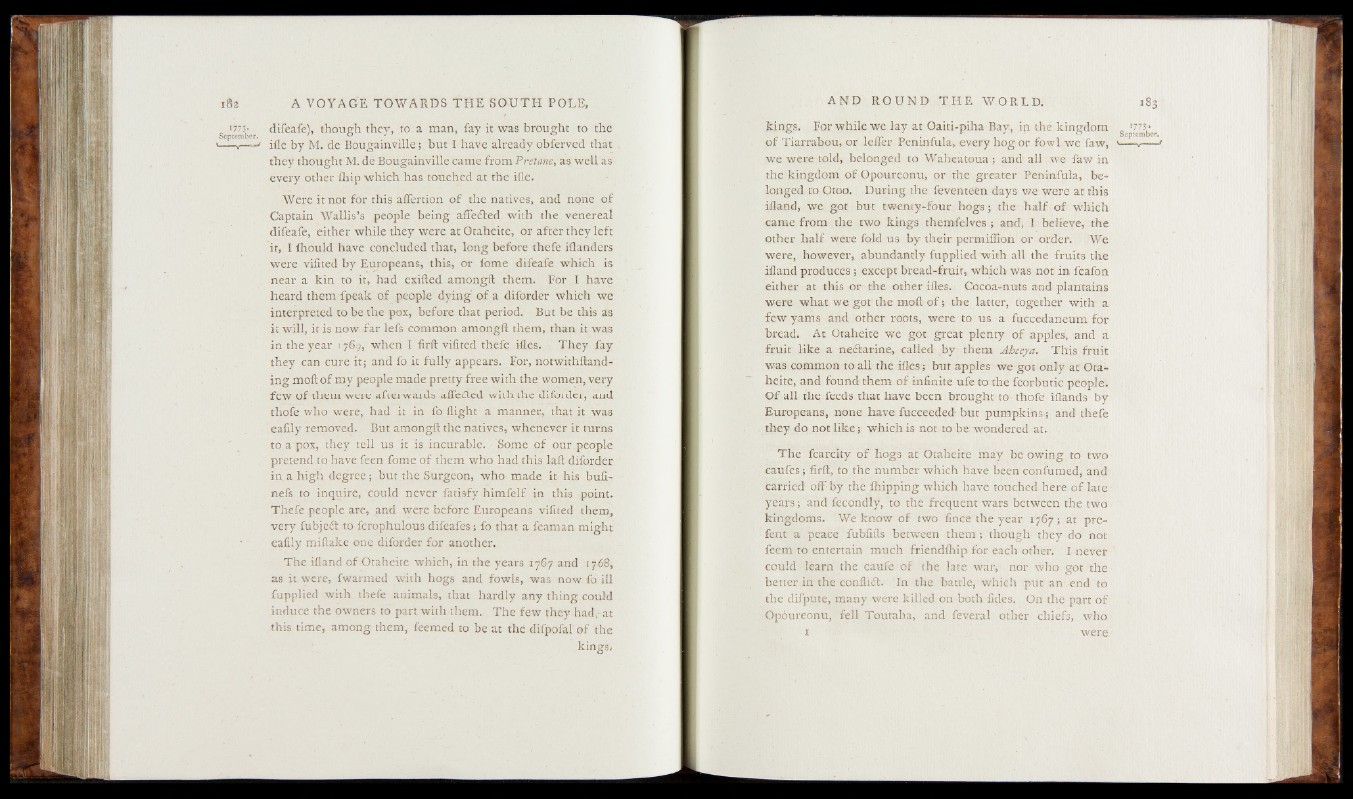
1773*
September. difeafe), though they, to a man, fay it was brought to the
ifle by M. de Bougainville;, but I have already obferved that
they thought M. de Bougainville came from Pretane, as well as
every other fhip which has touched at the ifle.
Were it not for this afiertion of the natives, and none of
Captain Wallis’s people being affefted with the venereal
difeafe, either while they were at Gtaheite, or after they left
it, I fhould have concluded that, long before thefe iflanders
were vifited by Europeans, this, or fome difeafe which is
near a kin to it, had exifted amongfl them. For I have
heard them fpeak of people dying of a diforder which we
interpreted to be the pox, before that period. But be this as
it will, it is now far lefs common amongfl: them, than it was
in the year 1769, when I firft vifited thefe ifles. They fay
they can cure it; and fo it fully appears. For, notwithftand-
ing moft of my people made pretty free with the women, very
few of them were afterwards aflecfted with the diforder, and
thofe who were, had it in fo flight a manner, that it was
eafily removed. But amongfl the natives, whenever it turns
to a pox, they tell us it is incurable. Some of our people
pretend to have feen fome of them who had this laft diforder
in a high degree; but the Surgeon, who made it his bufi-
nefs to inquire, could never fatisfy himfelf in this point.
Thefe people are, and were before Europeans vifited them,
very fubjeft to fcrophulous difeafes; fo that a feaman might
eafily miftake one diforder for another.
The iiland of Otaheite which, in the years 1767 and 1768,
as it were, fwarmed with hogs and fowls, was now fo ill
fupplied with thefe animals, that hardly any thing could
induce the owners to part with them. The few they-had,- at
this time, among them, feemed to be at the difpofal of the
kings*
kings. For while we lay at Oaiti-piha Bay, ip the kingdom Sept7e” b'er
of Tiarrabou, or lefler Peninfula, every hog or fowl we faw, 1----»----
we were told, belonged to Waheatoua; and all we faw in
the kingdom of Opoureonu, or the greater Peninfula, belonged
to Otoo. During the feventeen days we were at this
iiland, we got but twenty-four hogs; the half of which
came from the two kings themfelves ; and, I believe, the
other half were fold us by their permiffion or order. We
were, however, abundantly fupplied with all the fruits the
ifland produces ; except bread-fruit, which was not in feafon
either at this or the other ifles. Cocoa-nuts and plantains
were what we got the mofl of; the latter, together with a
few yams and other roots, were to us a fuccedaneum for
bread. At Otaheite we got great plenty of apples, and a
fruit like a nectarine, called by them Aheeya. This fruit
was common to all the ifles; but apples we got only at Otaheite,
and found them of infinite ufe to the fcorbutic people.
Of all the feeds that have been brought to thofe iflands by
Europeans, none have fucceeded- but pumpkins ; and thefe
they do not like; which is not to be wondered at.
The fcarcity of hogs at Otaheite may be owing to two
eaufes ; firft, to the number which have been confumed, and
carried off-by the flapping which have touched here of late
years; and fecondly', to the frequent wars between the two
kingdoms. We know of two fince the year 1767; at pre-
fent a peace fubfifts between them ; though they do not
feem to entertain much friendfliip for each other. I never
could learn the caufe of the late war, nor who got the
better in the conflict. In the battle, which put an end to
the difpute, many were killed on both fides. On the part of
Opoureonu, fell Touraha, and feveral other chiefs, who
were